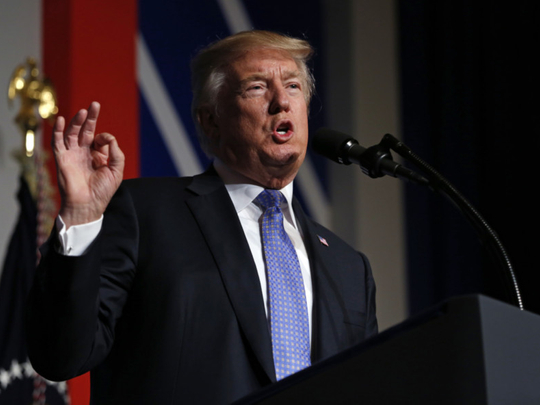
It was just a matter of time before the clock ticks to reconsider the Iranian nuclear agreement, which was repeatedly described by Trump as the “worst deal ever”, wrote the London-based Pan-Arab paper Asharq Al Awsat. “Washington didn’t announce withdrawing from the agreement since this scenario is seen by US officials as a knock-out that would make European partners slam the US. Washington, however, chose a modest solution by neither withdrawing from the deal nor permitting it to continue with its dangerous impact on the world and the region’s security and stability. Trump decertified that Iran is committed to the deal, describing it as an extremist regime. Iran manipulated the world via the bad nuclear deal, its militias expanded more and it exploited its Islamic Revolutionary Guard Corps in strengthening its militias. When enthusiasm was at its peak after announcing the nuclear deal in 2015, Saudi Arabia remained among the few states that sensed danger. It was frank in expressing concerns over Iran not abiding by the deal and warned the Iranians of their interventionist policy in the region.”
Twice since he came into office, Trump had recertified the Iranian nuclear agreement, but on the second go, he was reportedly upset that his team appeared to be steering him away from one of his chief pledges to voters, said the Saudi Gazette. “Trump has not ripped up the deal. What he has done, apart from not certifying it, is to send the deal to Congress, which has 60 days to decide whether to fix the deal in a manner in which satisfactory changes are made or to once again impose sanctions that in effect will kill the agreement. So, the deal’s fate is now in the hands of members of Congress who Trump wants to adopt new measures that might keep the deal intact while spelling out parameters by which the US would impose new sanctions should Iran violate its agreements. Trump now wants new provisions that will allow him to kill the accord or keep it. His warning: If he does not get the changes he wants, he will unilaterally abrogate the agreement, which as president; he has the power to do.”
The world breathed a sigh of relief in April 2015 when an international agreement was reached regarding the Iranian nuclear agreement, and the countries in the Gulf Cooperation Council welcomed it, said UAE’s Al Bayan. “The Gulf nations believed that Iran would change its policies and that it will use the lifting of sanctions as an opportunity to look after matters concerning the country and its people, who have suffered for long due to their nation’s hostile policy and ambitions to expand. However, nothing has changed. Iran’s tyranny and hostility grew in a way that started to threaten the entire region, with Trump pointing out that the ‘Iranian regime is threatening freedom of navigation in the Arabian Gulf and Red Sea, and its missiles are threatening our allies in the region.”
Trump made good on yet another of his campaign promises — to work to unravel the 2015 nuclear deal with Iran — by refusing to ‘certify’ that Tehran is complying with the terms of the agreement, said the Jordan Times. “He did not go as far as to withdraw his country from the accord that the US and five other countries — Britain, France, Germany, Russia and China — had signed, leaving it to the US Congress to decide, within 60 days, whether to reimpose economic sanctions on Iran that were lifted after the agreement was signed. The certification process is a periodic exercise for the US president. Trump had reluctantly endorsed the agreement twice since he took office, in January, but has been critical of it all along — as he is of every other endeavour taken during the administration of his predecessor, Barack Obama — insisting that it is “the worst deal ever”.





_resources1_16a31069e4e_small.jpg)





